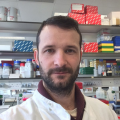
Gene therapy for genetic bladder disease Dr Neil Roberts (University of Manchester) presents his work on on the biological mechanisms of genetic disease, with the goal of developing novel therapies. Hosted by Prof Jenny Southgate.
Event details
Abstract
Three million people in the UK have a rare disease, a topic the NHS is now urgently addressing, with personalised medicines such as gene therapy envisaged as eventual gold standards. The long-term vision of my laboratory is for effective, safe, and long-lasting transformative medical treatments for people with rare early onset lower urinary tract (REOLUT) diseases. These have devastating life long effects, causing urinary incontinence and leading to life-threatening kidney failure. In this talk I will present our first steps to treating urofacial syndrome, a devastating genetic bladder condition caused by mutations in HPSE2. To understand the aetiology of this condition in Hpse2 mutant mice, we visualised the bladder using whole-tissue immunostaining and found defective autonomic nerve patterning. Physiological analysis of bladder tissue using a myogrpah confirmed autonomic nerve dysfunction, with both parasympathetic nerves in the bladder body and nitrergic nerves in the urethra severely affected. Building on these advances, we devised a gene therapy strategy based on adeno associated viral vector delivery of HPSE2 into new born mice. Intravenous treatment successfully targeted the transgene to bladder neurons. The neuro-muscular function of mutant bladders was strikingly improved, with treated mutants indistinguishable from wildtype, when assessed by myography. These findings indicate a route to clinical use and represent a template for other genetic conditions affecting the bladder and the autonomic nervous system.
About the speaker

Dr Neil Roberts
Neil is a Research Fellow working on the biological mechanisms of genetic disease, with the goal of developing novel therapies. In his Kidney Research UK funded Training Fellowship he elucidated the pathophysiology of the devastating congenital bladder disease urofacial syndrome, and began to unravel the function of the implicated genes HPSE2 and LRIG2. Neil's lab now runs preclinical trials of viral vector mediated gene therapy in mutant mouse models, with the eventual goal of translation to the clinic.